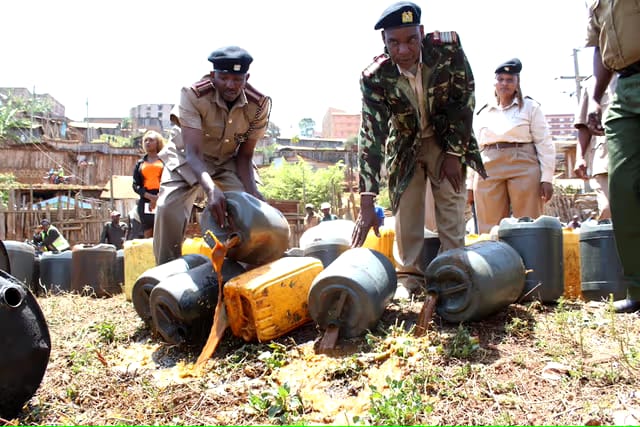Combating illicit brew remains a big concern in Kenya. Illicit brew refers to illegally produced or homemade alcoholic beverages. These drinks are typically manufactured without proper licencing and often using substandard or harmful ingredients. Illicit brew pose health risk and can contribute to social issues prompting authorities to combat their production and distribution.

One of the ways that Kenya has taken in the fight against illicit brew is strict law enforcement. The government of Kenya has taken it upon themselves to ensure that they patrol on all alcoholic vendors and ensure that there are no illicit brew being produced or sold in those particular places. All alcoholic vendors are also required to register themselves with the government of Kenya and have a licence that permits them to sell alcohol.
Public awareness has also been sensitised every now and then. Every time there is a local gathering, the topic of alcohol and drug abuse has been made as one of the agendas to ensure that the public understands the effects of drug and substance abuse. The dangers of illicit brew are publicly made known to the people and they are requested to report any known cases of it’s production or vending within the locals to the authorities.

The collaboration between authorities, community and businesses is one of the major ways that has proven to be a key in the successful war against illicit brew.
Illicit brew as stated above is often produced in unregulated conditions, it poses significant social, economic, and health consequences. Firstly, its consumption can lead to adverse health effects, ranging from health issues to long-term organ damage. The lack of quality control in production may result in contaminated or toxic substances being present in the brew, exacerbating health risks such as loss of eyesight and death.

Secondly, the economic impact is considerable, as illicit brewing undermines legal industries and government revenue. Tax evasion and illicit trade contribute to substantial revenue losses for governments, hindering the ability to fund public services and infrastructure. Additionally, the informal nature of illicit brewing often fosters an environment conducive to criminal activity, further jeopardizing community safety and stability. This has led to the government of Kenya finding the need to constantly combat the production and distribution of this brew.




